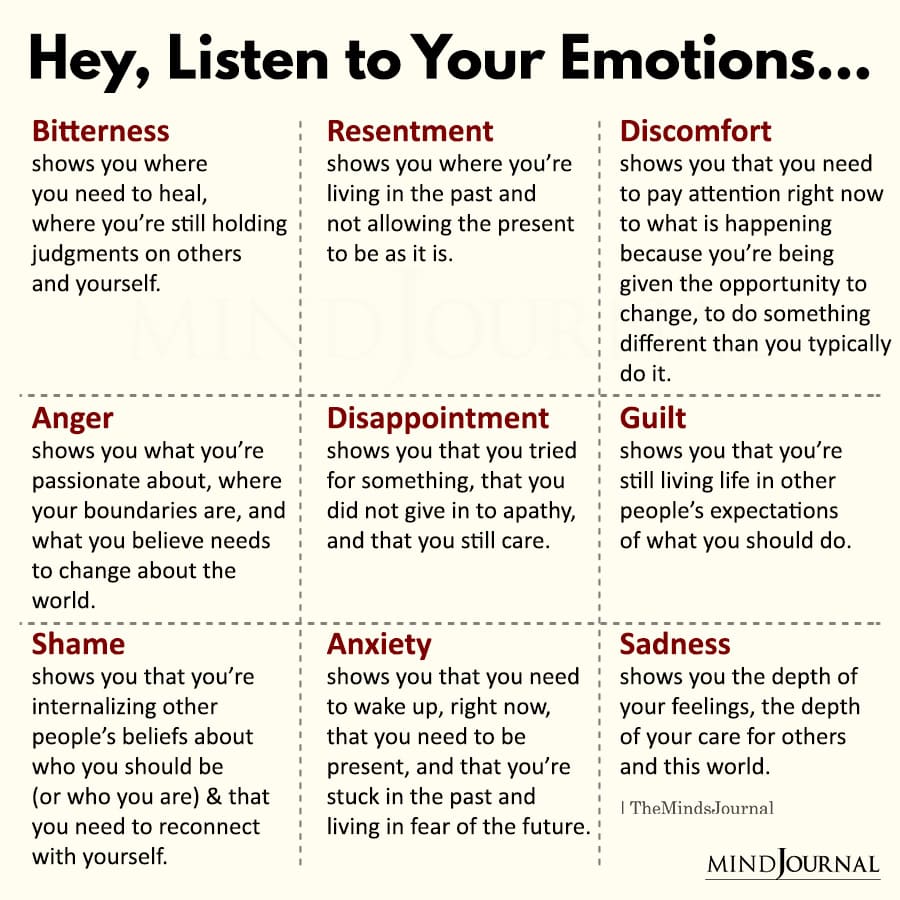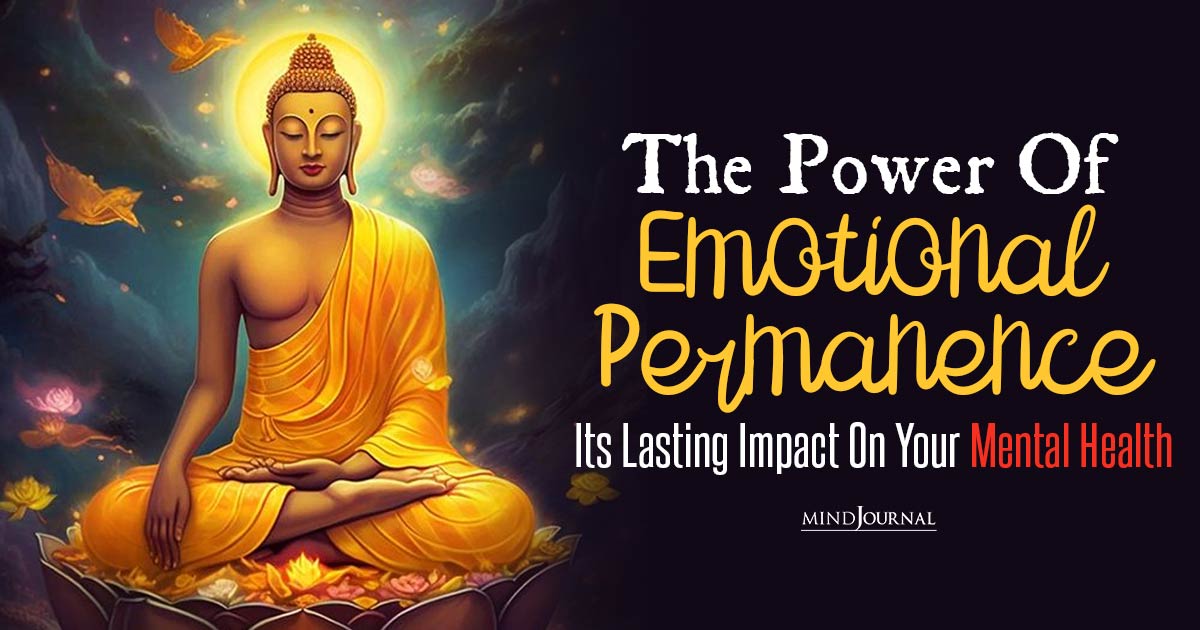Have you ever thought about how some relationships last a lifetime while others just crackle and shatter when under the pressure of emotional turbulence? But why do some relationships have such an intense emotional bond and are able to sustain? The answer is emotional permanence. What is emotional permanence?
Well, let us explore what is emotional permanence, what causes emotional permanence, emotional permanence symptoms, why emotional permanence in relationships is important and what lacking emotional permanence means. So let’s dive in.
What is Emotional Permanence?
It is our capability to maintain a stable and compatible emotional connection with our own self and others. Emotional permanence is the ability to express and experience emotions over time in a lasting and consistent manner.
It helps us identify and understand both positive and negative emotions and allows us to build a deep sense of trust, security, and intimacy in personal relationships.
Related: 19 Keys to Find the Security of Permanence in Life

Emotional Permanence Symptoms
There are certain common symptoms and signs observed in individuals with emotional permanence. Here are some of the most common emotional permanence symptoms –
1. Emotional Consistency
People with emotional permanence often have stable emotional states. They have an emotion range that remains unchanged and can be manifested appropriately at all times.
2. Balanced Responses
Such individuals can more easily respond to emotional stimuli with moderation or control than excessive reactions. Instead of being engulfed by strong emotions they maintain their balance leading to informed decisions.
3. Empathy and Understanding
People with emotional permanence have empathy for others’ feelings. This nurtures deeper connections since they are able to support others emotionally.
Now that we have learned about emotional permanence symptoms, let us also explore what causes emotional permanence as it will help us gain a better understanding about what is emotional permanence.
What Causes Emotional Permanence?
Various factors determine the extent to which emotional permanence can be achieved, both internally and externally. This means that emotions are influenced by many internal and external factors.
Here’s what causes emotional permanence –
1. Early Childhood Experiences
Emotional permanence is highly influenced by the kind of bonds and relationships one had in their early years. Good relationships with parents or primary caretakers in infancy and childhood are the basis for emotional regulation in adulthood.
2. Emotional Resilience
An individual’s ability to recover from adversity and life experiences can increase emotional permanence. Managing stress well and having good strategies for handling difficult feelings enable someone’s feelings to be stable emotionally.
3. Self-Awareness and Reflection
When people have self-awareness they know their emotional cycles and when triggers are activated. Self-reflection promotes personal development and facilitates improving emotional permanence by identifying and addressing emotional inconsistencies.
Emotional Permanence in Relationships
Understanding what is emotional permanence makes you realize that it is particularly necessary for effective relationships that stand the test of time. When both partners have a state of emotional permanency, they can have trust, security, love, compassion and understanding among each other.
Here’s how emotional permanence in relationships affects us:
1. Trust and Security
In relationships where both partners have achieved emotional permanence, a sense of trust and safety is established between them. It gives other people courage that these dependable people will not change their course so as to develop long-term intimate relations.
2. Effective Communication
With emotional permanency, individuals can express themselves more effectively in terms of what they require or how they feel about certain things. Genuine dialogues create deeper connections that stop misunderstandings from increasing into conflicts.
3. Conflict Resolution
It is easier, for those couples that have a changeless heart than those couples that don’t possess it, to resolve conflicts according to the above definition.
These people are more likely to approach conflict compassionately without necessarily having to win but to find mutually satisfactory solutions.
Related: Who Are We Really? Beyond Body, Thoughts, Emotions and Personality

Lacking Emotional Permanence
Unfortunately, not all people understand what is emotional permanence or have emotional permanence, and this leads to lack of emotional stability which can negatively impact relationships.
Some signs of lacking emotional permanence include:
1. Emotional Volatility
People who do not have emotional permanence usually have unpredictable mood swings. This makes it difficult for them to manage relationships because they will be overwhelmed by intense reactions.
2. Insecurity and Jealousy
For someone who does not possess emotional permanence, insecurity and jealousy can become issues. Trusting their partners may be difficult for them; hence, they always demand reassurance which might strain the relationship.
3. Emotional Withdrawal
Lacking emotional permanence leads to emotional withdrawal, which is an adaptation strategy among emotionally impermanent individuals.
They often struggle to express their emotions and may detach themselves from relationships, which can lead to isolation and loneliness.
How Does Emotional Permanence Affect Mental Health?
This feature of personality plays an important role in individual mental health. Here’s how it influences mental health:
1. Emotional Regulation
Emotional permanence is closely tied to emotional regulation – the ability to manage one’s own emotions well. People who possess it have a greater ability to control their feelings which leads to improved mental health.
This implies that they can navigate through moments of difficult emotions without being overwhelmed or having impulsive responses. This helps in reducing chances of suffering from psychological disorders such as anxiety and depression.
2. Resilience to Stress
Emotional stability enhances one’s resilience i.e., returning back to normal after facing an adverse situation and surviving life’s hardships. When confronted by situations that are trying on someone’s nerves, emotionally stable persons can still feel fine inside themselves.
They are better at coping with stressors so these people are less likely to stay under distress for extended periods or be at risk for developing chronic stress-related conditions.
3. Self-Esteem and Self-Worth
Positive self-esteem together with self-worth comes from emotional stability. A good sense of self and a healthy self-image are more likely to occur when an individual has a sound emotional base.
That is, they will not suffer heavily from negative thoughts about themselves or self-doubts or even engage in self-criticism.
4. Relationship Satisfaction
Emotional permanence greatly affects the quality of relationships, which is closely related to mental health. Emotional permanence helps people have better relationships and keep them going strong.
These positive connections provide a support system, promote feelings of belongingness, and contribute to overall mental well-being.
5. Coping with Trauma
Emotional permanence plays a pivotal role in coping with traumatic experiences. Those who possess emotional permanence are better equipped to process and integrate traumatic events into their lives.
They can seek right support, express emotions and work through trauma which leads to better mental health outcomes. Conversely, individuals without emotional permanence may struggle to heal from trauma leading to mental health disorders such as PTSD (post-traumatic stress disorder).
Related: The Model Of Relationship Development Describes The Stages of Emotional Connection
6. Positive Mental Outlook
Emotional permanence leads to a more positive mental outlook. A person who has attained emotional permanence is likely to view life optimistically and hopefully. Meaningful experiences can be derived from this, gratitude maintained and heightened life satisfaction.
Emotional permanence is inherently connected with good mental health. It fosters emotional regulation, resilience against stressors, self-esteem and healthy relationships.
Furthermore, it helps in coping with trauma and encourages a positive attitude towards life.

How to Develop Emotional Permanence
Understanding what is emotional permanence is not enough. We must also learn how to develop it.
Developing emotional permanence is about reflecting on oneself, practicing it and committing oneself to a personal development journey which enhances one’s mental wellness.
Here are some strategies that can help individuals cultivate emotional permanence and enhance their mental well-being:
1. Self-Awareness
Start by developing a deep understanding and awareness of your own emotions, triggers, and patterns of behavior.
Be reflective about yourself; engage in mindfulness training so that you can become more attuned to your emotional experiences. Recognize any patterns of emotional inconsistency by focusing on how certain situations or interactions affect your emotions.
2. Emotion Regulation Techniques
Learn different techniques for effectively regulating emotions. Stay present and calm even in highly charged moments through deep breathing exercises, grounding techniques, and meditation.
You may also keep a journal or take part in creative writing as a way to help you express and work through your emotions.
3. Build Resilience
Build resilience by learning how to cope with challenges and failures. The best way is to ensure that you have a network of friends, loved ones or professionals who can be of emotional help to you in times of crisis.
Proper self-care through measures such as exercise, proper sleep and balanced dieting also helps build resilience.
4. Seek Therapy or Counseling
Consult a psychiatrist, psychotherapist or any other mental health professional. They will advise you on how to develop emotional permanence and enhance your mental wellbeing.
Therapy can provide a safe space to explore and process emotions, work through past traumas, and learn healthy coping mechanisms.
5. Enhance Communication Skills
Learning effective communication necessitates cultivating emotional permanence in relationships. This can be achieved by keen listening, assertive expression as well as empathy and understanding.
You should express your emotions and meet your surrounding needs for better mental health.
6. Practice Self-Compassion
Learn to be gentle and caring towards yourself. Show the same love and consideration for yourself that you would show someone very dear to your heart.
Be compassionate about your own circumstances by acknowledging emotions without judging them or blaming oneself, thereby offering support during challenging moments. It helps you see oneself positively, improving mental well-being.
7. Engage in Meaningful Relationships
Embrace strong relationships that support emotional sustainability around you. Form connections with emotionally stable individuals who create an atmosphere of trust and safety.
They will have a sense of belongingness, validation and emotional security; whereby all contribute positively towards their improved mental well-being.
8. Practicing Mindfulness and Gratitude
Incorporate mindfulness and gratitude in your daily life. This involves being fully present in the moment, noticing your thoughts and emotions without criticism.
Regularly express appreciation for all the good things in your life and be grateful for all the experiences and relationships you have currently.
Emotional permanence can be developed through applying both practices by creating a positive mindset which results in reduced stress and anxiety.
Takeaway
So what is emotional permanence? Emotional permanence is a basic part of our emotional well-being as well as our relationships’ health. We could, therefore, cultivate lasting and satisfying bonds by nurturing it within us while fostering it in our relationships with others.
Understanding symptoms, causes, and the significance of emotional permanence empowers us to develop emotional stability, stronger resilient relationships.
Let us then undertake this transformative path towards emotional permanence for ourselves so that we can enjoy these profound benefits it brings into our lives.
Related: How To Overcome The Fear Of Losing Someone You Love: 10 Tips
Frequently Asked Questions (FAQs):
How do you practice emotional permanence?
To embody emotional permanence, emotions should be acknowledged, their changing state understood and an approach that is aware of emotions practiced.
Is emotional permanence a real thing?
Emotional permanence is not a widely known term in psychology. The concept may relate to recognizing the impermanence of emotions.
What is lack of emotional permanence a symptom of?
The lack of emotional permanence can be a sign of an emotional regulation disorder or mental illness such as borderline personality disorder.









Leave a Reply
You must be logged in to post a comment.